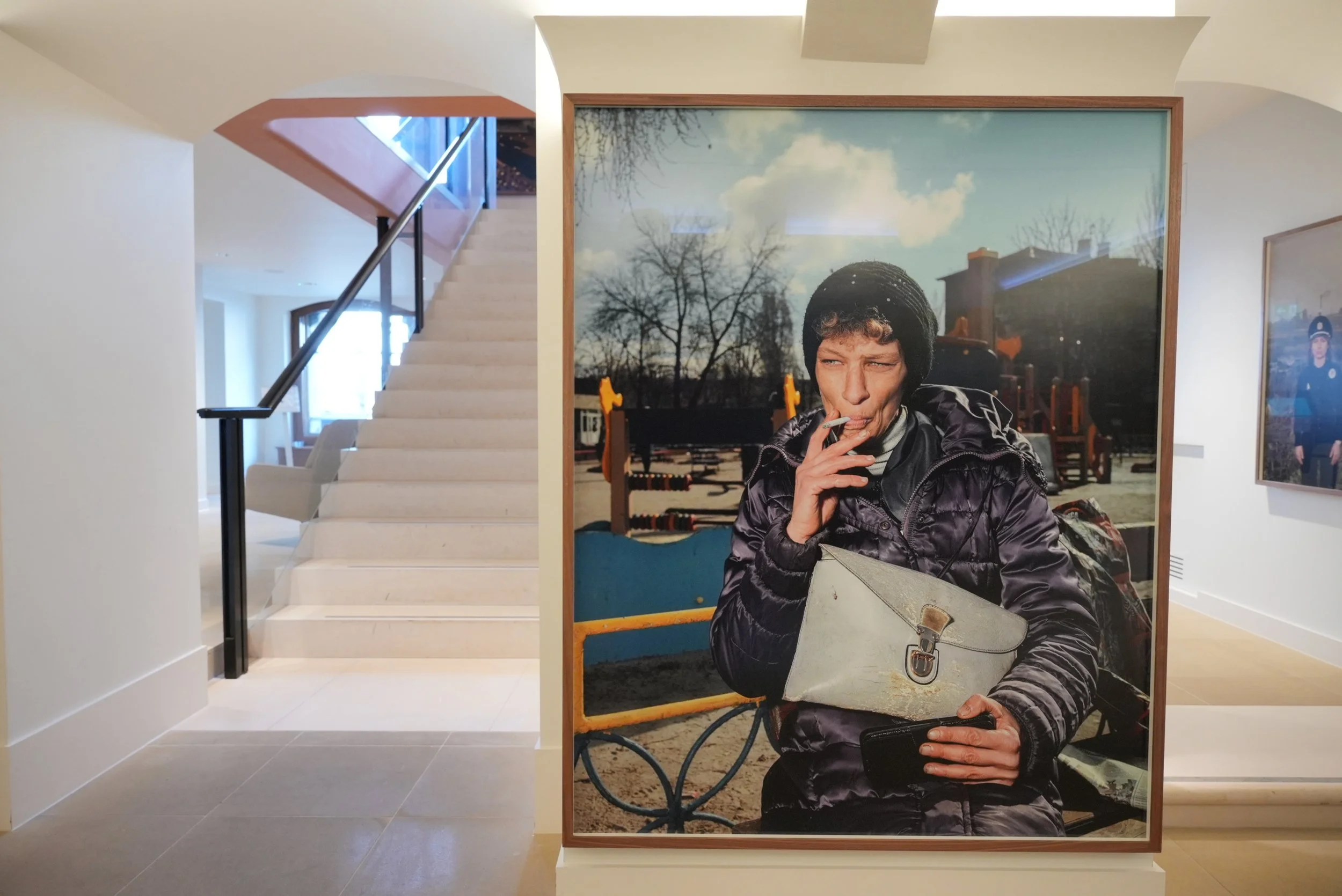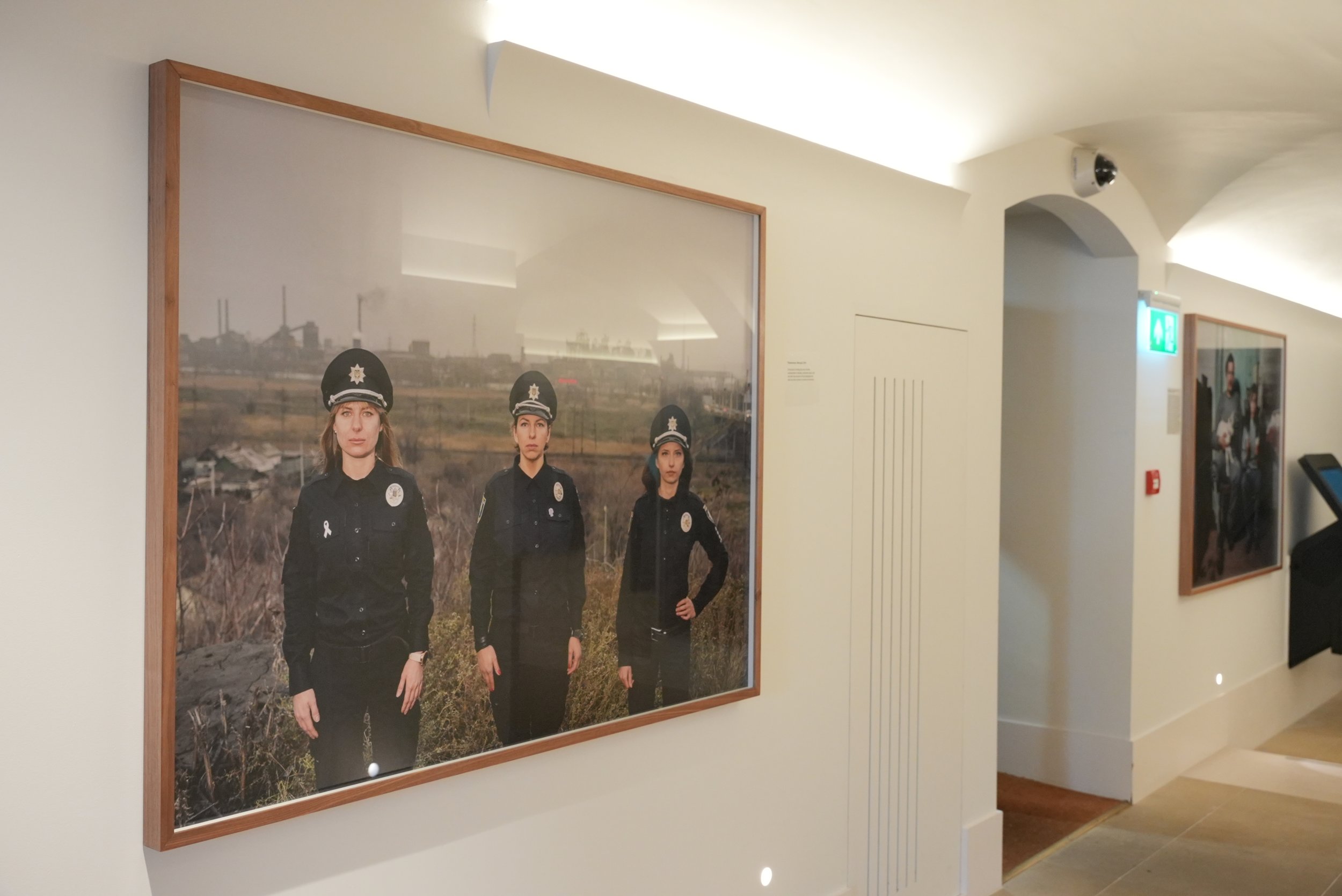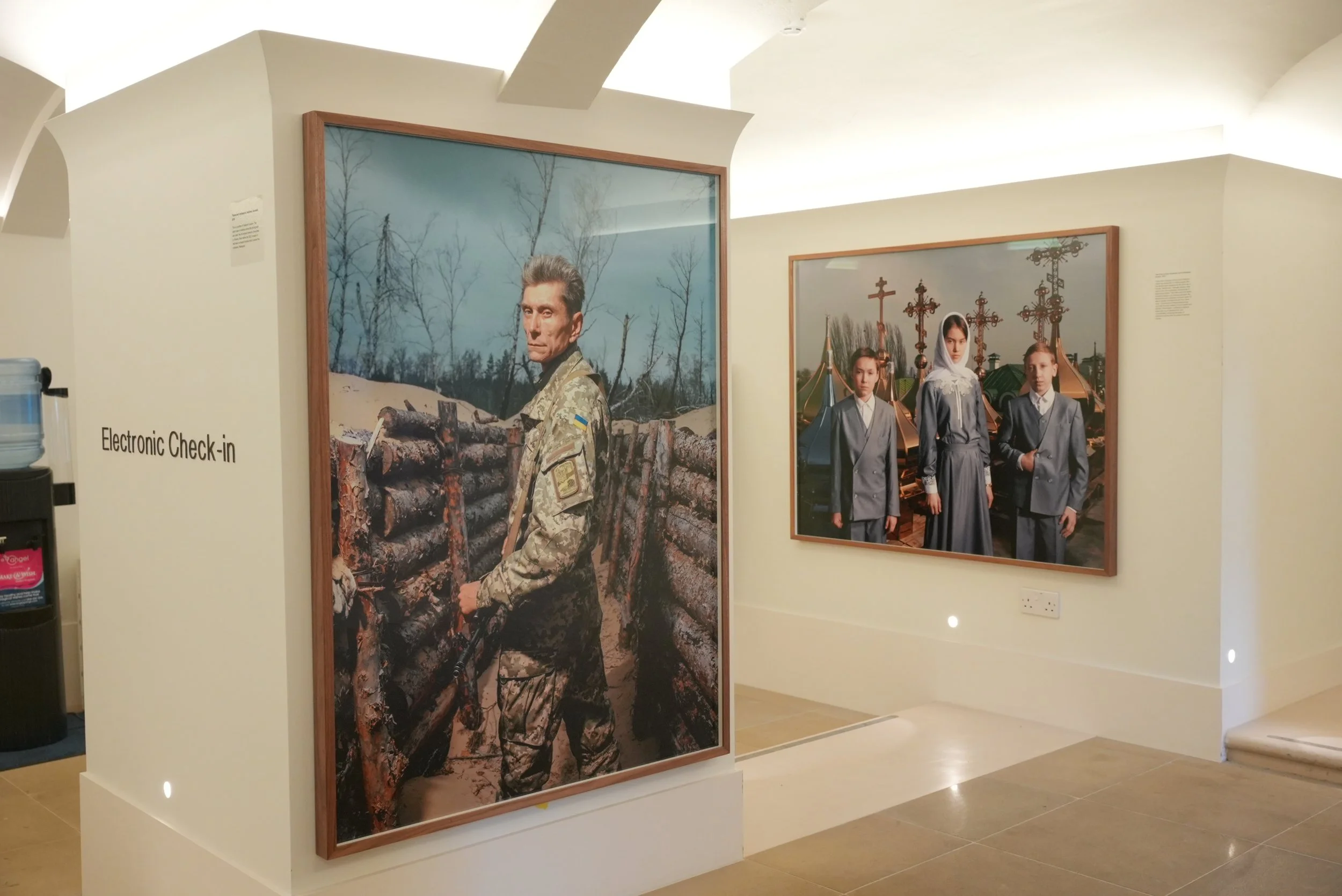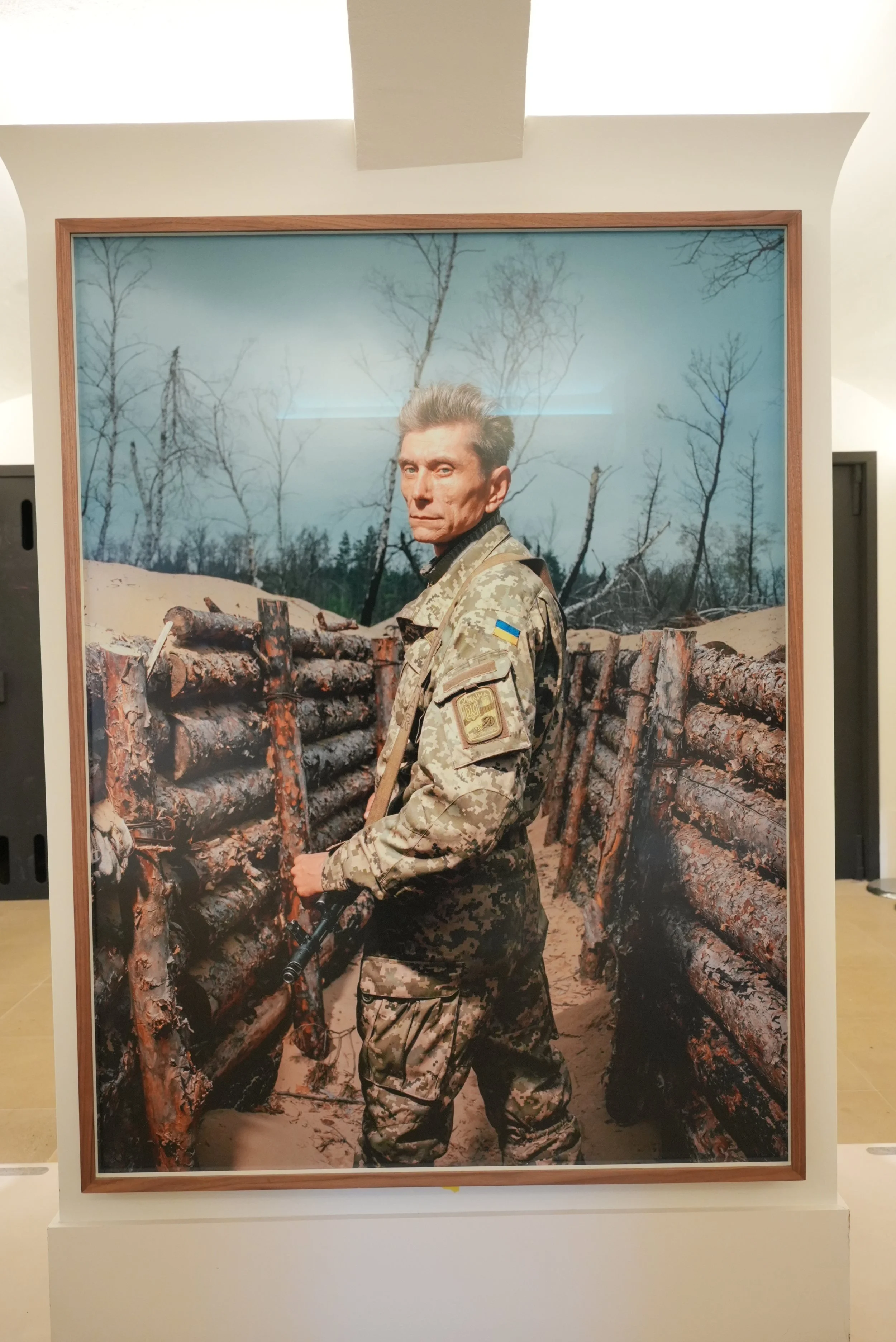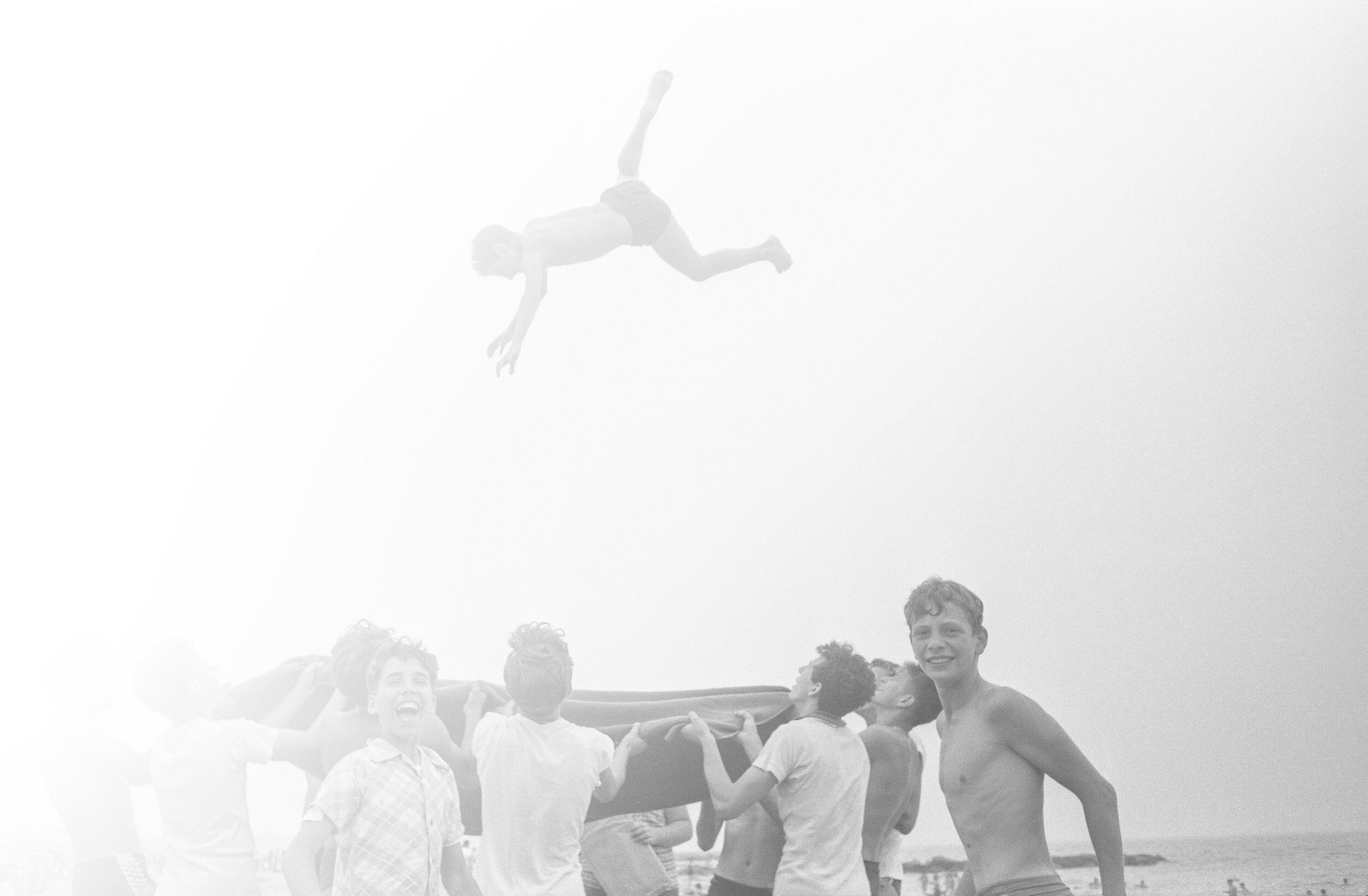Mark Neville: Foreign, Development and Commonwealth Office (Copy)
Long before Putin unlawfully invaded Ukraine, the British photographer self-funded a book in protest of Russian occupation. He knew that the country he calls home needed the support of the West to repel Russian invasion. His hope was that Stop Tanks With Books would add weight to those calls. 6 images from the book are now on view at the Foreign, Development and Commonwealth Office.
Mark Neville: Stop Tanks with Books
Foreign, Commonwealth & Development Office, London
November 2022 – Summer 2023
Thanks to the success of ‘Ukraine in Focus’ at the V&A, The Foreign, Development & Commonwealth got in touch and asked to feature the same six, large framed photographs taken from Mark Neville’s Stop Tanks With Books, in the lobby of their King Charles Street Offices.
Every person, dignitary and politician who visits the FDCO is confronted by Mark’s powerful images of Ukrainian, reminding them of the very human toll of the war in Ukraine. When Mark set out to create this body of work, it was because he knew the thing that “changes people’s minds about a conflict is a poem, a song, or a photograph. It’s people’s feelings that need to be changed.” Today, it remains Mark’s hope that his images can help stop the war in Ukraine.
To coincide with the exhibition, we are offering a limited edition, archival print from the series available for acquisition for the first time ever.
To acquire Neville’s work is to invest in his unique commitment and life-long belief that photography must have a direct social function, and that it must serve the subject matter in real ways. Acquiring Mark’s work is an endorsement both of his philosophy, as well as a way to support his fusion of photography and humanitarian aid in real terms as tries to establish a new, ethical role for photography on the ground in Ukraine.
The portraits on view at The Foreign, Development and Commonwealth Office - taken by British Photographer Mark Neville - offer a glimpse of life in Ukraine before the war with Russia began in 2022. They were taken over a period of five years, during the simmering conflict sparked by Russia’s invasion of eastern and southern parts of Ukraine in 2014. While the strain of living with constant threat is more immediately evident in some photographs than others, they all portray the humanity and resilience of a population now under direct attack.
One image shows members of a children’s choir who were among the millions of Ukrainians already displaced by the 2014 invasion. Another depicts a farmer who survived Russian imprisonment in 2015 but was later shot dead as he sat in his wheelchair at home in Zhytomir in 2022 . Meanwhile, holidaymakers picnic in Odesa, despite the looming possibility of further Russian aggression.
The photographs are all drawn from Neville’s Stop Tanks With Books. Sensing full-blown invasion was both inevitable and imminent, Neville rushed to finish and disseminate his book for free as an urgent plea for support. Stop Tanks With Books was six years in the making and included not only Neville’s photographs, but also short stories by Ukrainian writer Lyuba Yakimchuk about Russian occupation in 2014, and a call to action for the international community.
Neville completed the book and managed to send out 750 complimentary copies to a target audience of diplomats, politicians, peace negotiators, celebrities, NATO and EU members - everyone, in short, who we felt had it in their power to help Ukraine, just four days before the current war began. The concept was to weaponise the medium of the photo book and garner international support for Ukraine in its’ continuing fight for independence, help end Russian aggression in Donbas, and call for the withdrawal of Russia from Crimea. A second aim was to counteract the wealth of fake news and racist disinformation the Kremlin was generating - material that Western media was often perpetuating and reproducing unchallenged and unchecked - by presenting real portraits of Ukrainians.
Neville has been living in Kyiv, Ukraine since 2020, where he runs Postcode Ukraine, a hybrid humanitarian aid and documentary photography project that aims to disseminate his images of their aid missions in such a way as to re-engae a compassion-fatugued Western audience.
A message from Mark, February 2023:
”I write these words sitting at home in darkness. The current power cut has already lasted ten hours today. I am a British artist living and working in Kyiv, Ukraine. I have never regretted moving here, despite the war, such is my love for this country and its people. As part of my artistic practice, I make photo books about issues I feel strongly about and send them free of charge to a targeted audience in order to try and effect change. Making and disseminating Stop Tanks With Books was my attempt to fight Russian aggression. Interwoven in the book are my photographs, Lyuba Yakimchuk’s incredible short stories about living in Russian occupied Donbas, the research carried out by ZOiS about the 2.5 million people already displaced by the war by 2018, and the ‘call to action’, not just aiming to provoke empathy, but also to provide a clearer understanding of this brave, kind, misrepresented nation. I am extremely proud to say that following a solo exhibition at the V&A museum, prints and copies of the book from this project are now on exhibition at the Foreign, Commonwealth & Development Office.
From its inception in 2015, this project has had two aims. The first was to garner international support for Ukraine in its continuing fight for independence, help end Russian aggression in Donbas, and call for the withdrawal of Russia from Crimea. The second aim was to counteract the wealth of fake news and racist disinformation the Kremlin was generating, by presenting real portraits of Ukrainians. Complimentary copies of the book would be sent to a target audience of diplomats, politicians, peace negotiators, celebrities, and NATO and EU members - everyone, in short, who I felt had it in their power to help Ukraine.
In October 2020, I moved my home and studio from London, UK to start a new life in Kyiv, Ukraine. By October 2021, sensing that the war was imminent, I was working ceaselessly with my American publisher Nazraeli Press to get my book finished and sent out. We then put in place ‘book HQs’, in London, Paris, Berlin, Brussels, and New York, where centralised hubs could work to send out the 750 copies I could afford to print. Friends and colleagues worked non-stop to both assemble the VIP recipient lists and to physically get the books delivered as soon as possible. Four days before the Russian invasion of Ukraine we had succeeded in sending out about 200 of the 750 complimentary copies to the target audience, with the remaining copies being sent out quickly after that.
Then out of the blue, art collector couple, Bill and Judy, collectors of my photographs and recipients of my book Stop Tanks With Books, contacted me and asked, ‘What can we do to help?’. Of all the recipients of my book, ranging from the super-rich to the international media, to NATO members, celebrities, politicians, and world leaders, they were the only people who actually came forward and offered help in real terms. I proposed and they accepted to support a hybrid humanitarian aid and documentary project. Thus ‘Postcode Ukraine’ was born, and to date we have funded about $200,000 of aid, including medicine and food deliveries, and support for evacuation, education, and reconstruction projects.
But our mission has not just been about delivering humanitarian aid. We also realised that it was equally essential to make new, intelligent images and present them in resonant contexts to compassion-fatigued Western audiences in order to help people re-engage with Ukraine. Putting these artworks in a place visible to many key stakeholders reminds the international community of the people in Ukraine who are bravely fighting against Russia's illegal invasion, and The Foreign Office's commitment to supporting me in this endeavour demonstrates their support for Ukraine. The war is not over, there are still many battles to fight, and by helping Ukraine we help ourselves.”


